Spring is that time of year when campers, motorcycles and cabriolets come out of hiding to explore and feel the wind on their hubcaps. With this comes a thorough engine check and possibly an oil change to start things off running smoothly.
Whatever the reason, oil and antifreeze changes are a part of life and once complete, you are left with filters, messy bottles and waste oil and antifreeze to dispose of. Just what proper disposal looks like is not a matter of opinion. There is one accepted method, and it has its rhymes and reasons.
If you're brave and doing the change yourself, you’re asked to drain your oil and filter at the end and then place the filter in a sealable plastic bag. All the collected and used oil should then be put in a sealed container for transport to one of the BC Used Oil recycling stations.
In Powell River, the main location for this changed to Sunshine Disposal and Recycling on Franklin Avenue just last year after another local business discontinued this service due to contamination issues. You might as well use this service as you’ve already paid for it with the eco-fee embedded in lubrication oil purchases. Augusta Recyclers also receives oil during business hours, but at a charge per litre.
If you haven’t seen it yet, the Franklin Avenue drop-off location is pretty slick, in a good way. A lockable shipping container with barrels for the waste motor oil is open to the public Wednesdays and Saturdays between 10 am and 4 pm when staff will assist with handling materials, up to 10 litres at a time. They also take oil filters, oil containers and antifreeze, but it is not the drop-off location for other car-related fixings such as gas cans or tires.
Once collected, these materials find their way back into the marketplace, or are sent to fuel pulp mills along with cement and asphalt plants.
Motor oil can sometimes be refined. Oil filters are taken to steel mills to become reinforced steel and containers are recycled into new oil containers, drainage tiles and parking curbs. Whatever one’s opinion on some of these end uses, most will agree that dumping oil down a gutter, leaving empty bottles lying around as a fire hazard, or co-mingling engine oil bottles with regular recycling are potentially worse.
BC Used Oil collects a significant volume of oil each year, about 50 million litres, in fact. Participating in its program keeps oil and antifreeze from entering waterways and affecting marine life.
Next time you do an oil change, be sure to take the time to prevent leaching into the natural environment.
Let’s Talk Trash is qathet Regional District’s waste-reduction education program.



